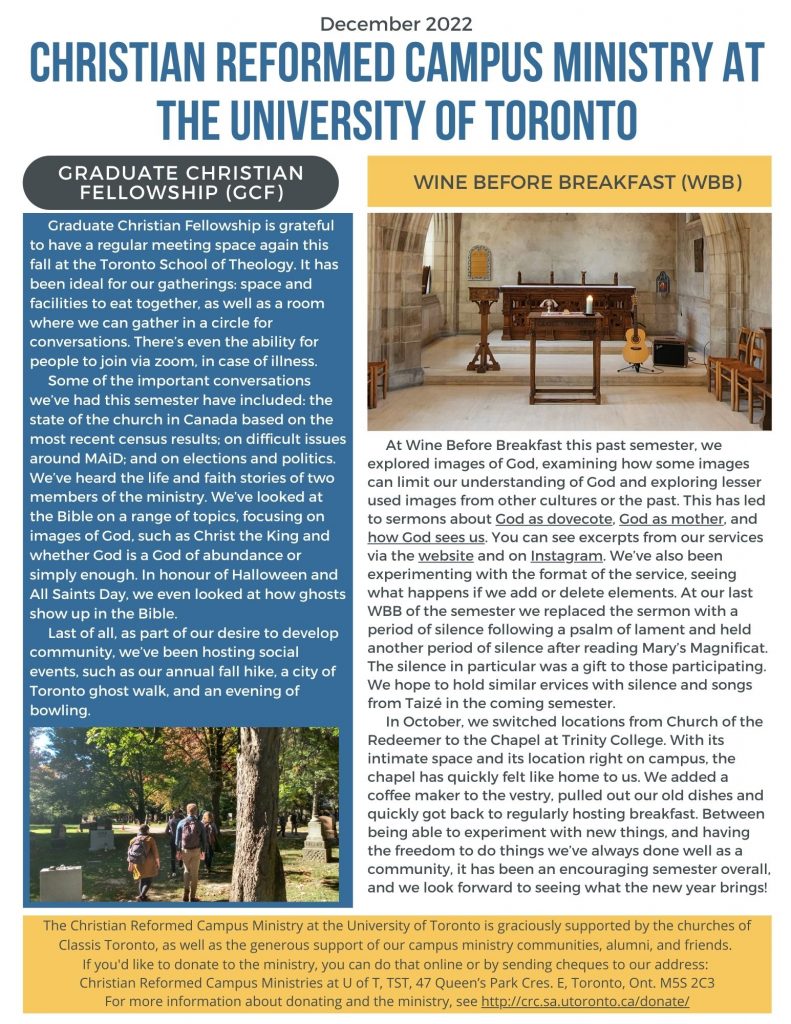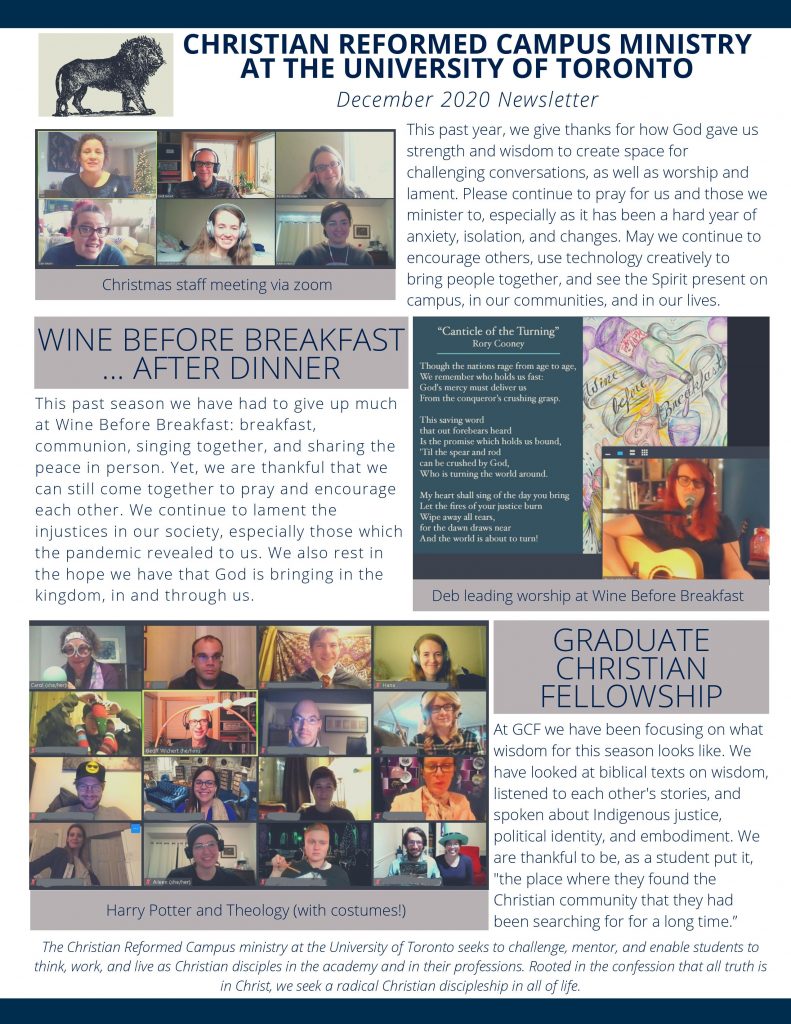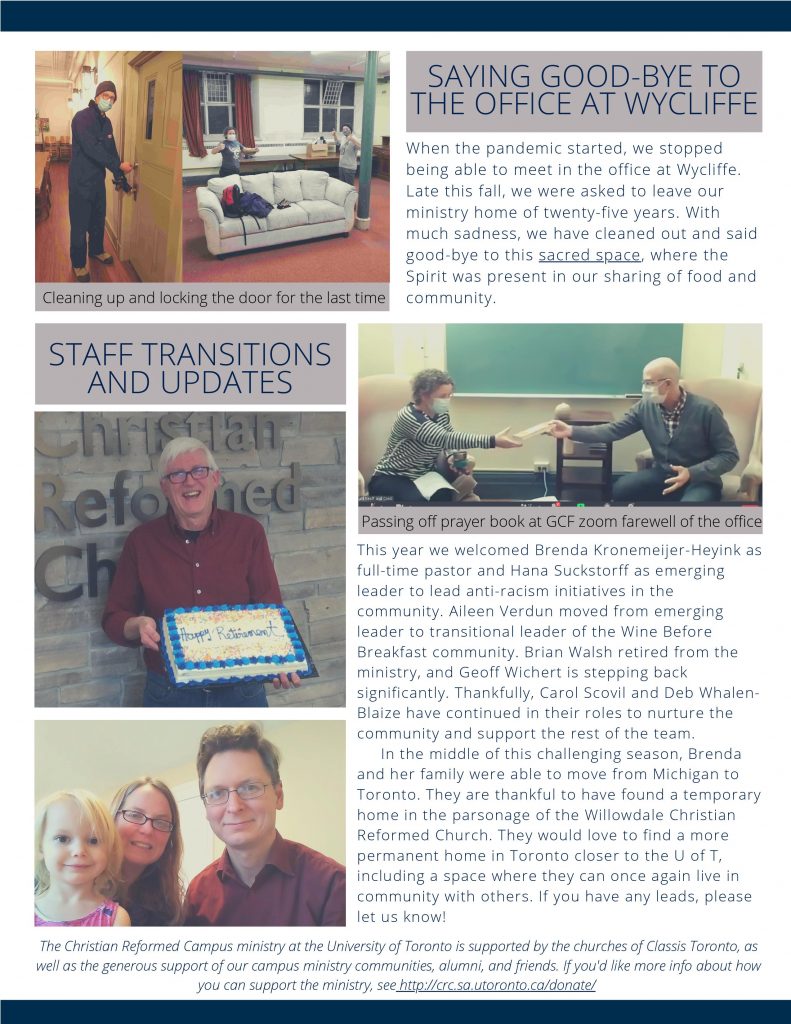The following sermon was preached by Michael Buttrey at Wine Before Breakfast on March 28, 2023, as part of our series on sin. He looks at James 1:12-15 and 1 John 5:14-17
Three years ago, I started to think there’s something weird with how Protestants talk about sin. I was at a pub west of here, and we were discussing what we do with theologians like John Howard Yoder, who abused his power to assault and harass dozens of women. The conversation was a struggle, in part because a professor insisted that “we’re all sinners.”
I’ve been thinking about that comment ever since. It’s true: all human beings are sinners. But in the context of that pub conversation, it was unhelpful. To see why, imagine a friend was telling you their child was sick and you replied that everyone dies eventually. True, yes, but in context you’re saying they shouldn’t care so much about their child. It’s cruelty disguised as insight.
Since then I’ve been looking for sources that understand sin differently. I don’t have a comprehensive theology of sin or anything like it; just a couple of ideas I’d like to share with you.
First, consider First John. I wasn’t very familiar with this letter, and I don’t think people preach on it as much as Paul’s letters. Reading it, you can understand why: it’s kind of a mess, and there’s some harsh and apocalyptic imagery in it.
There’s also a lot about sin, or broken ways as our translation puts it. In chapter 1 the author affirms that everyone has broken ways, saying that we call our Creator a liar if we claim not to have sinned. But in chapter 2 he says that he is writing so that we will not walk a path of broken ways – in other words, that we “may not sin.” Interesting, that.
Later in chapter 5 sin comes up again. In the passage read for us, the author says “you might see a sacred family member walking in a broken way that does not end in death. You should pray and that person will be given life.” Ok, great. Pray for other people when they’ve gone astray, got it. But then: “There is a broken way that ends with death. If that is so, prayer will not help.” What? Prayer doesn’t always help? And finally: “All who do wrong walk in broken ways, but not all broken ways end in death.”
If you’re a Protestant, your alarm bells may be going off. If not, here’s another translation of the last verse: “All wrongdoing is sin, but there is sin that is not deadly.” Ding ding ding! Non-Protestant doctrine detected. This text seems to be suggesting that some sins are deadly, and some aren’t. Eugh!
Actually many Christians through the ages, even notable Protestant Martin Luther, made distinctions between what they called mortal or deadly and venial or non-deadly sins. However, the distinction has fallen out of fashion since 16th century theologian and influencer John Calvin attacked it, calling it “absurd” and “an insult to God.”
Now to be fair to Calvin, I think his purpose in attacking distinctions between sins was to emphasize how God’s mercy is great enough to pardon any sin. Thomas Aquinas makes a similar point about this passage: we can’t reliably tell how deadly people’s sins are, so we shouldn’t deny anyone the help of prayer. I agree!
We can also rightly worry that making distinctions can risk self-righteousness. Remember Jesus’ parable where a Pharisee thanks God that he’s not like that tax collector? Distinguishing between mortal and venial sins can easily turn into the classic game of “my sins are venial, your sins are mortal.”
At the same time, I think there are practical contexts where we need to make judgements. For example, I know of a couple churches that consider the offence of “publicly criticizing church leader” to be worse than “sexual harassment.” Personally, I think that’s completely backwards. But the solution, I’d suggest, isn’t to abolish all distinctions, but to make better ones.
Even in the most progressive community, there will come a time when someone may need to be excluded for everyone’s safety. If so, that decision had better be based on careful distinctions, not just what the leaders personally find annoying.
Another role for distinctions may be in our own spiritual development. For example, in my own life, should I be more concerned about laziness and sloth? Or wishing ill on people I don’t like? Are those exactly, equally bad for the health of my soul? This passage doesn’t answer this question, but it does suggest there are reasons for different levels of concern.
Turning now to our other passage. James is a famously rigorous letter, and the comments on sin are no exception. However, notice the progression here. In the passage read, James discusses temptation, and argues against the idea that the Great Spirit is responsible for tempting us. Rather, James says we tempt ourselves when we are lured and enticed by our desires. Then, when an evil desire takes root in our hearts, it gives birth to broken ways, or sin. Finally, when these broken ways have taken over, they drag us down a path that leads to… death.
Sounds dismal, doesn’t it? But notice how the word “when” is repeated 3 times. This happens in stages. Sin doesn’t arise out of nowhere, take over our hearts, and immediately doom us to death for breaking God’s law. It’s a process, which means it can be interrupted.
If you haven’t already removed the battery from it, I bet your Protestant alarm is going off again. Am I suggesting sin can just be avoided?
Well no – and yes. The problem is that discussions about sin happen on at least two different levels, or contexts. On one level, capital S sin can’t be avoided. Everyone sins. On another level, there’s evidence certain lowercase sins can be avoided. After all, the murder rate varies enormously between individuals: most people commit 0 murders, some commit 1, and a few, many.
The confusion between these levels arises in part because theologians are generally concerned with big picture questions, like why do human beings sin? Why does humanity need redemption? The answer is usually doctrines like the Fall, and maybe also free will, depending on the theologian.
But for me, my most urgent questions are more personal. Why are some people impatient with their spouses, and others are serial sexual predators? Can I avoid certain serious sins? Why am I tempted in this particular way? Is it even possible to become a better person?
The doctrine of the fall doesn’t answer these personal questions. Neither does the idea of free will, except to say “try harder.” Trusting in Jesus is certainly helpful, definitely a good idea, but also kind of mysterious.
Nowadays people are more likely to ask their therapist such personal questions than their priest. And that’s fine, I’m not sure I’d want to tell my priest all my problems, and they definitely don’t have enough time to listen to mine and everyone else’s. But even though the authors of the New Testament weren’t psychologists, they had insights into the human person, and they were interested in these questions. Thus, any good theology of sin should reflect these very scriptural nuances.
So let’s return to the text. One thing I really appreciate about the First Nations Version is how it uses the phrase “broken ways” for sin. In the context of our passages, that phrase suggests to me that sin is like a journey – “walking in broken ways.” But on a journey you can stop, change course, turn around. You don’t have to keep walking brokenly.
James makes the same point with the three stages of sin. Yes, desires can entice us, but they don’t have to take root in our hearts. Or even if they take root, broken ways don’t have to take us over. The progressive process can be interrupted at each point. And not just out of our own willpower – maybe, as 1 John suggests, it’ll be because someone is praying for us.
Now, you may find the idea of making distinctions between sins and examining your desires exhausting. If so, I get it. Life is already full of demands, and I don’t want to add any more burdens to your journey. The good news – and it is good news – is that you don’t need to understand sin in order to be redeemed from it.
But if you want to better understand the broken ways in our world, I think there’s some real resources out there – in psychology, ethics, theology and even the Bible. All we need to explore them is to turn off that Protestant alarm for a bit.
Amen.




